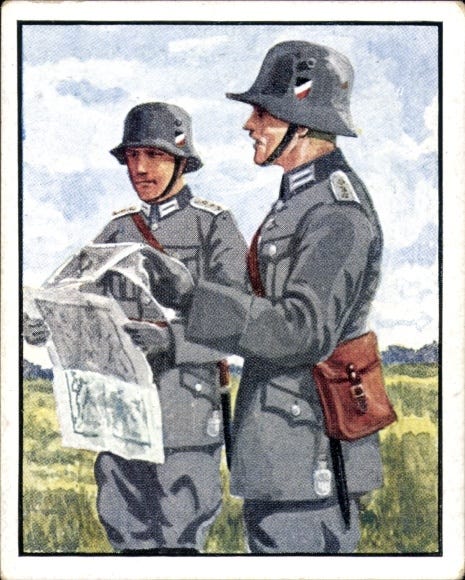August 1 - August 7, 1942.
Summary:
Fritz Hartnagel’s promotion to Captain comes through. Now that he has the rank he’s wanted for so long, he wishes he did not have it. He would rather turn his back on the entire system.
He throws the obligatory promotion party, buying lots of booze in the hopes that everyone will get drunk fast so he can leave early. Only he drinks too much as well, leaving him with a horrible hangover. The hangover makes him wish for things that are good and real.
Fritz debates men in his company about the difference between military orders and “internal orders,” the latter coming from one’s conscience. His men see that as weakness, lack of self-confidence, servile sycophancy. But Fritz considers internal orders the most important.
When he argues with his C.O. about the Nazi concept of population policy (lots and lots of children!), he realizes that it’s all about power and control, even though no one seems to know why they want power and control in the first place.
He acts on an “internal order” when a young man is convicted of petty theft. As Fritz reviews the case, he sees that an unjust punishment awaits the young man. He follows the internal order in defiance of the military order and refuses to submit the paperwork to hand the young soldier over for sentencing. He lectures him instead.
Russians bomb their position, and for the second time in the war, Fritz’s signal corps unit is forced to fire on the enemy.
Fritz tells Sophie that their eastward trek towards Stalingrad has come to a standstill due to Russian resistance. They are eating well, but there is a great deal of sickness. Fritz attributes the outbreak of dysentery to the weather - blazing hot during the day, miserably cold at night. In August!
He ventures use of the forbidden L-word (love) in a letter to Sophie.
Why this matters:
After the war, Fritz Hartnagel became a judge. His legacy? Working on legislation and advocating on behalf of conscientious objector status for young men who were pacifists. He would even serve as defense counsel for the tougher cases.
Until he made that his passion, there had never been conscientious objector status in Germany.
The first time I read his letter where he describes “internal orders,” I understood that this had been brewing inside him for years. Even his remorse at having to shoot at Russian planes underscores how uncomfortable he felt in a military uniform - a sea change from the young man who had wholeheartedly embraced a military career.
To me, Fritz Hartnagel’s change of heart, and his subsequent political activism for social justice - that is the real legacy of Sophie Scholl. Not the syrupy, sugary “woman of valor” portrayal in contemporary media. But the lasting effects of her debate regarding personal responsibility and the meaning of the word Fatherland.Fritz Hartnagel’s observation that his fellow officers did not care about the legitimacy of Nazi political concepts - in this case, population policy, i.e., women should have as many children as possible - and that all they were interested in was power and control, even though they didn’t know why they wanted power and control? This “why this matters” writes itself. We are seeing this play out in real time.
Have you ever acted on an “internal order” in contravention of a military order or other command? Talk about it here!
White Rose History, Volume II, pages 155-157.
Notes and references available only to paid subscribers.
Listen to this episode with a 7-day free trial
Subscribe to Why This Matters to listen to this post and get 7 days of free access to the full post archives.












